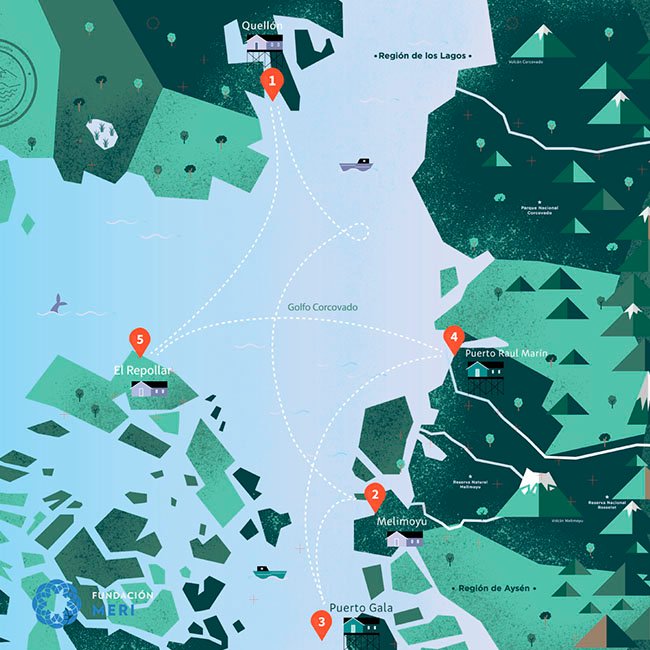ENVIRONMENTAL EDUCATION
The environmental education carried out by MERI Foundation aims to promote the valuation and protection of the Conservation Targets (CT) of the Elemental Reserves, using the ecosystem approach.
Lack of knowledge influences a large part of the threats that affect the conservation of Chile’s natural heritage. Education to recognize threats, and the promotion of best practices to avoid them, can reduce their negative effects and encourage people and institutions, both public and private, to conserve their territory and natural heritage.
MERI is currently developing this line of action in territories located at latitudes 22°, 33°, and 44°, which are associated with the Puribeter, Likandes, and Melimoyu Elemental Reserves, respectively. In northern Patagonia or latitude 44°, MERI has been conducting environmental education programs and activities for 6 years, while the other territories are in the planning and design phase.
Loving nature is not enough to protect it, we need to know how we impact it (threats) and what we can do to take care of it (best environmental practices).
- They are guided by the objectives of environmental education set by UNESCO in 1977, at the Tbilisi International Conference.
- They consider humans as multidimensional beings, and so they are based on the methodology of comprehensive and experiential learning, meaning they include corporal, emotional, sensorial, and cognitive aspects in their work within the ecosystem approach.
- They facilitate opportunities for educational encounters and knowledge exchange with the inhabitants of the territories.
- They promote conservation in the daily lives and vocations of children, young people, and adults, so that the inhabitants and institutions are part of the conservation of their territory.
Effective conservation is challenging, so in each territory we work with children, young people, and adults, and always consider the participation and/or collaboration of the private, public, and civil sectors.
Coverage
Since 2015, we have progressively increased the coverage of our educational programs and activities at latitude 44°, including children, young people, and adults from towns and rural schools on the coast of northern Patagonia.
Initially, priority was given to work in localities and rural multi-grade schools in the municipalities of Cisnes and Las Guaitecas in the Aysén region. Since 2017, we have been gradually expanding coverage to the provinces of Chiloé and Palena in the Los Lagos region. Today, environmental education activities at latitude 44° are being implemented in different locations throughout the territory.
In the case of schools in the municipalities of Cisnes and Las Guaitecas, every year since 2016, MERI has been carrying out the Educational Navigation Route. This sea route takes the MERI Environmental Education Programs to the students of the multi-grade schools closest to the Melimoyu Elemental Reserve, in localities with mainly maritime access surrounding the Corcovado Gulf.
- Puerto Gala: Madre de la Divina Providencia School
- Melimoyu: Melimoyu Public School.
- Raúl Marín Balmaceda: Amanda Labarca Humberstone School.
- Melinka: Repollal School.
- Quellón: San Agustín Educational Center.
In 2018, MERI expanded the coverage of its environmental education programs and activities on the Isla Grande de Chiloé. Today, educational programs are being implemented in three rural multi-grade schools in the Rilán Peninsula area of the Castro municipality:
- Inés Bazán School
- Curahue School
- La Estancia School
In the case of other educational or local institutions (municipalities, neighborhood councils, or other social groups) that are present in the coverage area and interested in participating in environmental care events, we have shorter environmental education activities that are organized in advance with the interested parties.
We work in close collaboration with communities and local stakeholders who can actively contribute to the reduction of threats and the dissemination of best environmental practices.
Navegantes Camp is an environmental education program aimed at students from 5th to 8th grade in the regions of Los Lagos and Aysén who stay 3 days and 2 nights in the Melimoyu Elemental Reserve.
The program seeks to awaken a sense of ecosystemic belonging through a connection with nature in the Melimoyu Elemental Reserve, through educational encounters and bonding between children and adolescents who live in Northern Patagonia. The camp is run with the support of professionals and scientists from MERI Foundation, who facilitate comprehensive and hands-on learning experiences, and ensure the safety and well-being of the participants.
To select the participants, every year students in 5th through 8th grade from the municipalities of Castro, Chaitén, Quellón, Cisnes and Las Guaitecas are invited to apply for the “Navegantes School Science Competition.”
This competition seeks to encourage students’ interest in research, inviting them to submit their own research on ecosystems and biodiversity, or on the local culture and history of northern Patagonia, as well as on technologies that help solve environmental problems in their territory.
For more information about the competition and how to apply, please request the rules and regulations at: info@fundacionmeri.cl
Los Chono or Guaiteca are an extinct native people. They were a nomadic and canoeing people that inhabited the southern channels of Chile, from the Chiloé Archipelago to the Taitao Peninsula and the Gulf of Penas (XI region), who traveled in their canoes or dalcas in search of food and shelter.
There are still traces of their existence and ancestral knowledge in this territory. So, in order to highlight their importance and legacy, MERI has created a video and an educational activity for students so they can relive their culture and recognize the Chono ancestral knowledge that is part of the traditional customs and trades of the southern territory.
If you would like to arrange a visit to your school, community, or institution, please contact us at:



